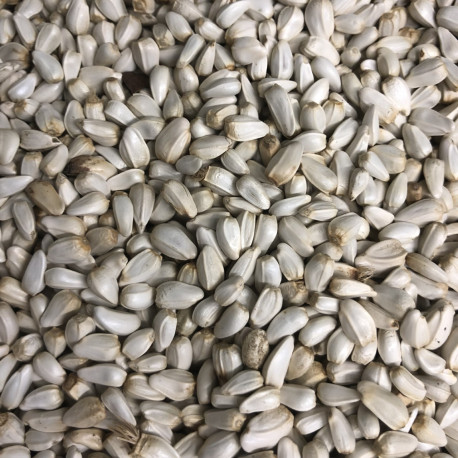



Reference: CARDI-KG
The Cardy seed is rich in protein and linoleic acid, which helps reduce cholesterol levels and therefore decreases the risk of heart disease. It is found in mixes for budgerigars and parrots, but also for native birds such as bullfinches.
Cardy seeds are high in fat. The amino acid proportions of the seed are very favourable, with a very high arginine content. The seed is low in lysine and methionine + cystine, while tryptophan is completely lacking.
The Cardi seed is rich in protein and linoleic acid, which helps to lower cholesterol levels and thus reduce heart diseases. It is found in parakeet and parrot mixes, as well as for native birds such as bullfinches.
Cardi seeds are rich in fat. The amino acid proportions of the seed are very favourable, with a very high arginine content. The seed is low in lysine and methionine + cystine, while tryptophan is completely absent.
Couscous is a hard grain semolina that is steamed until the small grains are obtained, which are then dried. Couscous is excellent for supplementing the feeding food of nestlings or adults. Wet the couscous with hot water, let it swell for a few minutes then add to the egg food (for 1 teaspoon of couscous plan 4-5 teaspoons of food), coloring, fruit.
Clover stimulates the immune system and slows down cellular ageing through its excellent antioxidant properties. Rich in vitamins B, C, E and provitamin A.
Seed rich in protein, mainly present in pigeon mixes, appreciated by pigeons.
High-quality seeds with high fat content
- With a high content of vitamin E, B9, B5, B6, B1, B2, B3, and vitamin K.
- It has antioxidant properties.
- Excellent energy contribution.
- Rich in calcium, potassium, magnesium, phosphorus, proteins, zinc, thiamine, pectin (cleanses the body).
Grass seed is very low in fat, it is ideal for small exotic birds and siskins, but it is suitable for all birds.
Niger, birdseed rich in phosphorus and calcium. Niger seeds (or nyjer seeds) are fine seeds rich in oil. They come from Guizotia abyssinica (also known as Guizotia oleiferous). The niger is highly prized by most birds, goldfinches and siskins love it.
The seed is mainly grown in India, Burma, Ethiopia and Nepal. Niger is an oilseed with a high fat content (38-43%) and protein content (23%). It provides quality food for all species of wild and forest birds, both in dry and sprouted form.
Niger is one of the few birdseeds with a good ratio of calcium to phosphorus.
Improves liver and overall health of birds.
Suitable for a wide range of birds, including parrots, canaries, budgerigars, and other exotic birds.
Benefits for birds:
- Liver support.
- Detoxification: Helps eliminate toxins from the liver and improves digestion.
- Strengthening the immune system.
Instructions for use:
Dosage: Add a small amount (usually a teaspoon per day) to the birds' usual seeds. The amount may vary depending on the size and specific needs of the birds. Can be mixed with the birds' daily food.
Precautions:
Store in a cool, dry place, away from moisture and direct sunlight.
They have the property of binding to minerals such as calcium, iron and zinc and making them less bioavailable.
Chia is sage. It is an annual plant up to 1 m tall whose scientific name is Salvia hispanica.
The composition of chia seed closely resembles that of other mucilaginous seeds such as flaxseeds and psyllium. Unlike flaxseed, however, chia does not have anti-nutritional factors, factors that limit the use of flaxseed without prior hot treatment. Anti-nutritional factors are cyanogenic glycosides or linatins, inhibitors of vitamin B6 that prevent its action. Chia also has a much more pleasant taste than flaxseed and birds consume it more willingly.
Basil 1kg
Basil contains many antioxidants, is anti-inflammatory, and helps against stress. This does not mean that basil is considered a medicine. Dried basil is of course also different from fresh basil plants. But the fact remains: basil is good for health.
Soybeans are an excellent source of iron, zinc, manganese, copper, selenium, potassium, vitamins, fiber, polyunsaturated fatty acids and antioxidants, in short, it is an excellent dietary supplement.
Soybeans are often used in sprouting seed mixes.
Buckwheat is a seed that is very low in fat but rich in carbohydrates. This seed is ideal for feeding show finches and European birds.

The Cardy seed is rich in protein and linoleic acid, which helps reduce cholesterol levels and therefore decreases the risk of heart disease. It is found in mixes for budgerigars and parrots, but also for native birds such as bullfinches.
Cardy seeds are high in fat. The amino acid proportions of the seed are very favourable, with a very high arginine content. The seed is low in lysine and methionine + cystine, while tryptophan is completely lacking.
